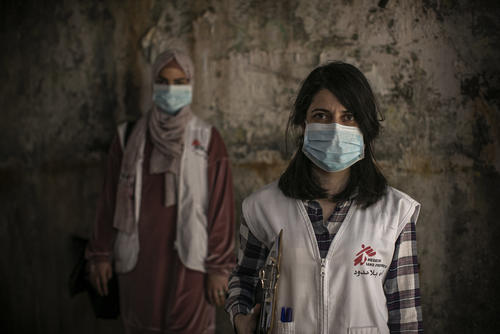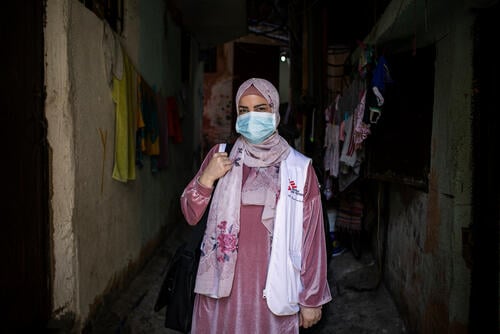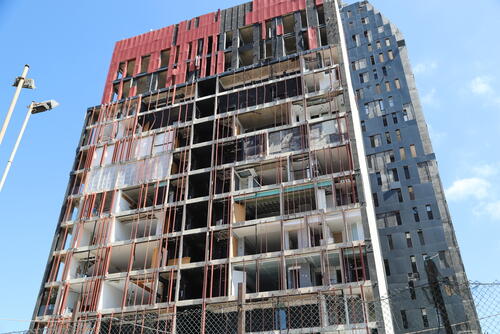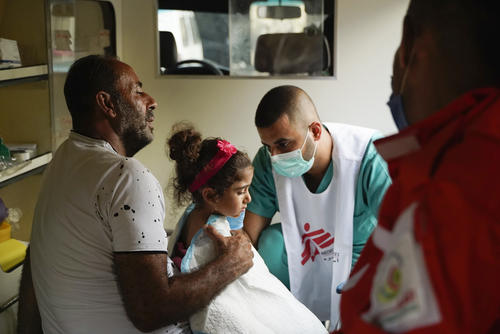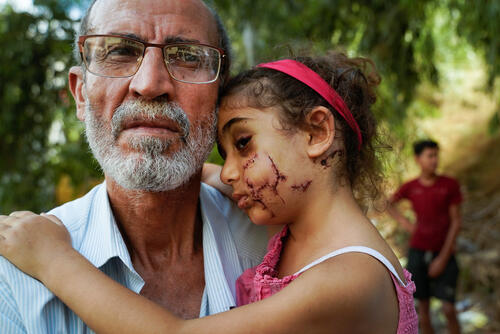“We watch the news every day. The situation is depressing and sad,” says Hussein, a 60-year-old man, living in the Palestinian refugee camp of Burj Al-Barajneh, south of Beirut, Lebanon. “The number of people infected with COVID-19 is increasing and the number of people dying because of it is also constantly on the rise. Why wouldn’t we protect ourselves if we are given the opportunity to do so?”
Hussein’s 53-year-old wife, Aida, is one of the many vulnerable patients regularly receiving home care visits by Médecins Sans Frontières (MSF) teams. Recently, on top of the regular MSF services they received, the couple agreed to be part of a pilot programme put in place by MSF to respond to the COVID-19 pandemic in the country.
For the past weeks, we have been training and assisting vulnerable families in Burj Al-Barajneh camps, like Hussein and Aida’s, to the practice of shielding. Shielding consists of creating ‘green zones’, or safe zones, where individuals more susceptible to COVID-19 are kept protected from any potential source of infection. The areas where they stay can either be inside the household or in separate locations, in the neighbourhood. During the shielding phase, these people should have minimal physical interactions with their relatives and other community members.
Based on a voluntary approach, the goal is to provide solutions for additional protection to people who may suffer severe effects if they have COVID-19. This can be achieved by adding some simple measures at home; however this also requires thought and dedication. The elderly, people living with chronic diseases, and people with weak immune systems are among those that MSF teams are reaching out to with this new activity.
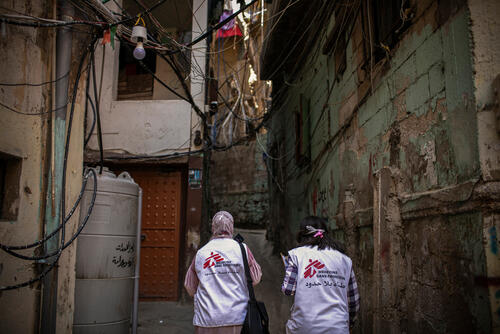
“Introducing shielding in this overcrowded camp was a pragmatic decision,” says Marta Miazek, MSF’s nurse in charge of the pilot project. “We wanted to find solutions for people to protect themselves, even for people who are at high risk of having medical complications if they contract COVID-19.”
“We’ve been working in this camp for years and many of our patients suffer from complicated medical conditions, making them more vulnerable,” says Miazek. “We needed to help but also to remain as realistic as possible in terms of what could be done. In that regard, shielding seemed like the most practical option.”
“Whenever we use the word shielding, people’s first reaction is generally fear. They see it as creating physical barriers around them,” says Miazek. “But we explain to the patients that shielding doesn’t necessarily mean going far or cutting communication with their loved ones.”
“When they understand this, people feel reassured,” continues Miazek. “We are trying to be very mindful of how people feel, and we make sure each step of this shielding approach is properly explained, so that they understand the benefit of it.”
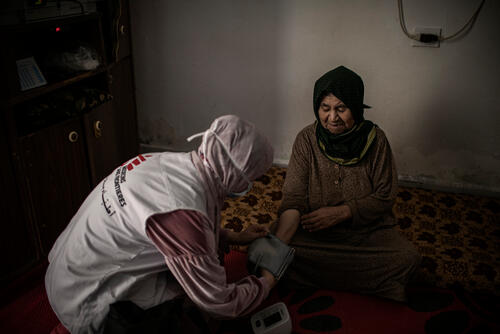
Maryam, who is 90 years old, suffers from diabetes and hypertension. She is also taking part in our team’s initiative. She lives with five family members in a small house inside the camp, which made it a bit more difficult to find her ‘safe zone’ at first. Eventually, she chose one of the mattresses on the floor as her safe zone after agreeing with her family. She has spent most of her time sitting on it, over the past few days.
“I feel safe here. My daughter-in-law, who takes care of me, keeps the area clean and disinfected,” says Maryam.
“I understood that frequent cleaning is crucial to prevent the spread of the virus,” says her daughter-in-law Israa, while sitting at a safe distance from Maryam. “So, I clean the surfaces, the doorknobs and the floor on a regular basis. And I pay extra attention to the surfaces surrounding the mattress.”
In addition to educating the families about shielding, MSF is also providing them with hygiene kits, which include soap and shampoo.
“Uninterrupted access to water, cleaning products and materials are essential for shielding to be successful,” says Dayana Tabbarah, an MSF health promoter.
Along with her colleague Hala, a nurse, she provides tips on protection and preventive measures to patients and their relatives.
The team in Burj Al-Barjaneh visits the families who have agreed to join the pilot project on a regular basis. A nurse runs the usual medical check-ups related to the patient’s chronic disease, and the health promoter ensures that the families are doing well, and that they can still maintain the measures recommended.
Yet, their visits have developed a more sentimental value to the families participating. As shielding requires people to both avoid welcoming many guests at home and going out, the visit of MSF workers is in fact one of the only visits they receive. Over the past few weeks, the bond between the MSF team and the families participating in the pilot project has become stronger.
MSF has also started implementing the same activity in Bar Elias, a town located in central Bekaa, where we also run a hospital.



